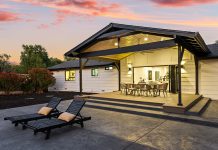Next Tuesday, Aug. 14, at 1 p.m. the Sonoma County Board of Supervisors will hear the Westside Farms proposal for a winery, hospitality facilities and 22 events at 7097 Westside Road, Healdsburg. This is a decision-making hearing where the supervisors can approve, approve with changes, or deny this project plan and inform the applicant as to the changes needed.
The project was appealed last year by community groups concerned about significant road safety policy issues and unstudied environmental impacts. In addition, there is concern that many of the project’s features set dangerous precedents for inappropriate event center development throughout Sonoma County.
A major complaint was that it is a large scale project, with three commercial kitchens and multiple tasting rooms with access driveways on both sides of the road. In 2012, the Hop Kiln winery project of the same size and scale as Westside Farms was unanimously rejected by the county zoning board.
Westside Farms would generate significant traffic in an area with inadequate sight lines and blind hills and curves; creating a dangerous stretch of road where there are already four other existing and proposed tasting rooms winery/event facilities, including a wedding venue, located within a half-mile of the Westside Farms property.
County standards clearly state that drivers should have enough sight distance to not be forced to hit the brakes or take other evasive action to avoid a collision with customers leaving a tasting room.
This requirement is designed to protect public safety and is of particular importance for a road such as Westside, where there are nearly 30 approved tasting rooms and wineries, speeding drivers and many bicycles. This requirement, as well as a density standard to address multiple commercial driveways in close proximity are designed to protect public safety.
The appellants listed four concerns in the appeal, including that the project “generates significant employee, public and truck traffic in an area with inadequate sight lines.” The second complaint was that it was a “large scale project, with tasting rooms on both sides of the road, situated within an approximate 1,000-foot radius of three existing tasting rooms (and) is detrimental to the rural character of the area.”
Also, appellants noted the over-concentration issue. The high intensity hospitality and promotional nature of the project detrimentally adds to the cumulative impacts of the existing over-concentration of wineries in the Westside area, which has 29 wineries/tasting rooms permitted, and a road hosting over 20 large-scale bicycle events, which already presents safety hazards and joint road use conflicts. Since 2008, the county general plan has required policy standards, but development of standards has been continuously delayed.
Appellants include Forests Unlimited, an organization working to protect forests and watersheds, with specific concerns about the removal of mature native trees and the project’s water impacts. Additional appellants are Healdsburg Citizens for Sustainable Solutions, a group concerned with detrimental concentrations of tasting rooms in Healdsburg and in the county; Sonoma Coast Rural Preservation near Gualala and the Maacama Watershed Alliance of Knights Valley, both of whom are focused on protecting fragile ecosystems from over-commercialization, especially our coastal zones, and lands protected by the Franz Valley Specific Plan respectively.
According to Westside Road resident and grape grower, Marc Bommersbach: “The real issue here is that county officials have decided to ignore this road safety requirement and use a downgraded standard in order to get this tasting room approved. This means that approaching drivers will have a only a minimum amount of distance to react to a car or truck exiting the tasting room and slam on the brakes to avoid a collision, assuming that the no one is speeding, there are no bicycles to avoid and no one has been drinking too much – a lot of assumptions.”
The public expects our county officials to put road safety first, and on Aug. 14 make a determination to uphold its stated road safety requirement, and not downgrade the standard when considering more tasting rooms.
Warren Watkins, supportive of Healdsburg’s density standard for tasting rooms, summed it up: “In 2014 and again in 2016, the board of supervisors passed resolutions directing planning staff to address areas of concentration. Just like the cities of Healdsburg and Sonoma are setting density standards in their downtown areas, let’s stop kicking the can down the road. It is time to address the cumulative impacts from the commercialization of ag land, and define protective standards that preserve what brings tourists to Sonoma County in the first place — our rural character and small town charm.”
— Padi Selwyn is the co-chair of Preserve Rural Sonoma County









